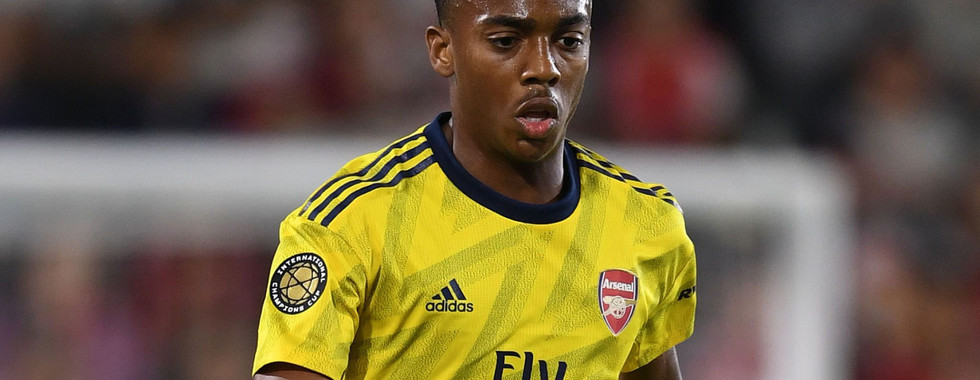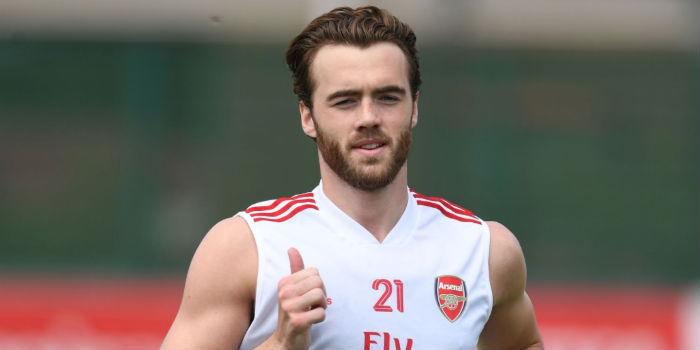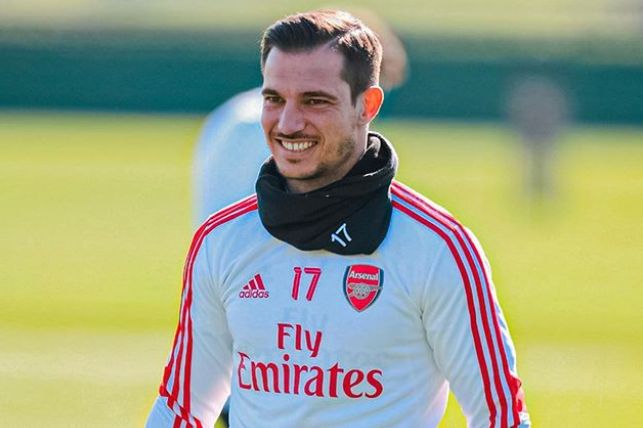
We shouldn’t get overly excited about a Community Shield victory over a Liverpool squad that looks more like the team from February and March that was struggling to eke out wins against Norwich City, West Ham United and the like, and outright losing to Chelsea in the FA Cup and Atletico Madrid in the Champions League than historic team we saw earlier. The champions are still the champions and are, for now, the team to beat but they are vulnerable.
Nonetheless, the Gunners are making readily apparent progress.
That is now a victory in the league and a penalty shootout win against the defending Premier League champions in their last two meetings. The results must be acknowledged ; too often over many years, Arsenal has played fantastic football without obtaining the necessary result. So, yes, the scoreline is important, but perhaps more inspiring is the method and the obvious positive effects the manager has had.
Mikel Arteta seemed destined for a bright future as a manager when he started working with Pep Guardiola. His tutelage started much earlier and he was greatly influenced by Arsène Wenger and David Moyes as well. He was studious as a player and was already planning his ascent into management before he hung up his boots. His discipline, passion and clear vision suggested that he might be better equipped than other player-turned-managers such as Steven Gerrard, Frank Lampard and Andrea Pirlo (although two of those have started well so far and the other has yet to coach a game). There is still a long way to go and Arteta has yet to complete a full season, but the Gunners, for the first time in a long time, look like they have a progressive plan with a modern coach who inspires not just fans but players alike.
Arteta’s vision is clear. To be succinct, he wants his group to be confident playing out from the back, almost reminiscent of Maurizio Sarri’s Napoli in terms of drawing in the opposition, physically fit, tactically disciplined, dangerous on the break but also capable of breaking down the opposition (this is still very much in development) and a positive pressing side (although they are capable of adapting against strong sides as they shown against Liverpool).
That is not all, however. Arteta is just one reason for carefully renewed optimism among Arsenal fans.
—

Nicolas Pépé disappointed a few in his first season who may have expected more from such an expensive signing but his talent is obvious and fans and media sometimes neglect the difficulty in adapting to a new country, culture, league and team. His first season was far from a failure and he looks to be a dangerous weapon for Arsenal. With speed, technique and audacity in abundance he is capable of that little bit of magic that can separate sides. Improvement should be expected. If Arteta releases him from some of his tactical and defensive duties his base statistics might better reflect his ability. That, however, is a style that has appropriately died down in elite football. So, Pépé will have to buy in and buckle down tactically, particularly with the presence of up-and-coming Bukayo Saka and newly arrived Willian (and even Eddie Nketiah). If he does he could be set to grow exponentially in the next couple of seasons.
—

Pierre-Emerick Aubameyang, captain and best player on the team, is likely to stay. The season is about to start and although they have Alexandre Lacazette a striker who is good at everything, and Nketiah waiting in the wings, there is no one who combines Aubameyang’s speed, finishing ability, confidence, consistency and daring at the club. Few indeed in the world, let alone in the league. Aubameyang, who earlier in his career was perhaps unfairly judged to be at times a difficult personality, has fit in well with Arteta’s demands and continued his superb scoring marks since his move from Germany while also upgrading his build-up play. Arsenal would be loathe to lose him for nothing at the end of his contract, but letting him leave now for a reduced prize would be a major blow not just for their on-field performance but for the feeling of positivity and evolution around the club. The Gunners cannot afford to lose their talisman, a term thrown about often but quite appropriate here. They can’t and they won’t, not this year.
—
The focus on youth makes any fanbase excited, but these particular youth products look to have genuine Arsenal potential.
18-year old Bukayo Saka is an absolute gem but he is not the only young player looking to breakthrough. Gabriel Martinelli was struck down by a knee injury, but the 19-year old was exciting teammates and fans before the end of his season. When Aubameyang does leave, Arsenal could very well have two players ready to take on a much bigger mantel. Eddie Nketiah, 21, seems to have the support of the manager and although not as scintillating as his two aforementioned teammates, sometimes being trusted by the one in charge is the key factor in unlocking a young player’s potential. Joe Willock, 21, made progress last season and will be hoping to prove himself the solution to a problem area for the club. The young man was unsurprisingly inconsistent last season ; this season will be crucial.
Reiss Nelson, 20, another precocious English winger, like his friend Jadon Sancho, might be the youngster in the most precarious position. Willian has just arrived and although he could be very useful specifically in experience and immediate quality, Pépé and, in particular, Nelson will suffer. Pépé and Nelson are both directly penalized by Willian’s presence but Pépé is a recent big-money acquisition who contributed more last season, is more established in football and is stylistically less like Willian which could give him the edge as an alternate option.
Only Matteo Guendouzi, 21, is in a more tenuous situation.
The supremely talented and strong-willed French midfielder is equally frustrating and bright and might have already played his last game for Arsenal. If so, that is a shame. He has butt heads with the manager. His disciplinary issues might wreck what was a potentially luminescent career in London.
Guendouzi and Lucas Torreira are both undervalued and under-appreciated. However, if sold, Arsenal should get a decent return and also liberate space and wages to better form Arteta’s vision of the team and midfield in terms of personality and style. If kept, Arteta appears to be the type of manager who can make players better and get them to play his way and Torreira showed at Sampdoria and at the World Cup for Uruguay his impact on a team and at only 24 he has yet to reach his peak or fully learn his game.
—

Emiliano Martinez, after being loaned out an outstanding number of times, has seized his chance after Bernd Leno’s knee injury. Neither is a world-class keeper but the competition in goal should result in higher performance levels. It’ll be up to the gaffer to be decisive and consistent when Leno returns.
—

Kieran Tierney is another positive. The former Celtic man missed much of the previous season due to injury but looks to be adapting well to the Premier League and may have solved another long-term problem area for Arsenal. This is, of course, dependent on his continued good health and progress. Even the backup role is well-equipped. Despite some tactical concerns, Sead Kolasinac is an apt deputy, except for injury issues. His wages are high for such a role but if Tierney continues with his development, Kolasinac is a decent enough backup who might not have to play too many league games and can save Arsenal from spending in the transfer market, primarily if they don’t have a youth player coming in or don’t want to adapt another player such as Saka or Ainsley Maitland-Niles. He is also available to play centerback in a back three if the team is in a very tight pinch.
—
Centerback reinforcements by sheer quantity if not quality have improved the club’s stock. They can, reasonably, call on French youngster William Saliba, Sokratis, Rob Holding, Shkodran Mustafi, Calum Chambers, David Luiz, Kolasinac, Pablo Marí and, just now at time of writing, Brazilian Gabriel, an almost guaranteed starter. Now, anyone would prefer to have quality over numbers but this at least provides Arteta with options, both young and experienced. They are unlikely to all stay this season and thus could also deliver much needed revenue.
—
Even the right back position is relatively strong. Locker room leader Héctor Bellerín is joined by solid second-option and Premier League-experienced Cédric Soares, who has been at Arsenal for the past nine months, and Maitland-Niles can play there as well. Cédric might be an injury concern and Bellerín most certainly is with his progress having been significantly curtailed in his promising career but at their best they can energetically and hold down the right side of the defense.
Things are looking bright at Arsenal but there remains some potential potholes.
Mesut Özil’s situation is still to be resolved and could very well result in him spending much of the season on the bench or at home. If so, his wages will remain unavailable to the club’s use.
Injury-plagued players are still one of Arsenal’s curses : Tierney, Kolasinac, Torreira, Holding, Chambers, Héctor Bellerín. This is an issue that has dated back to Arsène Wenger, including players such as Aaron Ramsey, Jack Wilshere, Abou Diaby and Robin van Persie.
Dani Ceballos may or may not be returning. If he does, it is likely on loan. That will, hopefully, transform into a permanent signing next season as it is always perilous to rely so heavily on a temporary player. If he doesn’t return after impressing the previous season, that is a blow to Arsenal and may also throw a wrench in their plans surrounding Torreira and Guendouzi.
—
Acquiring two 30-years+ players, Brazilians David Luiz and Willian, from London rivals Chelsea in as many years while potentially losing two gifted young players is certainly cause for concern and suggests poor long-term planning. The departure of Raúl Sanllehí plus the release of dozens of employees (a pandemic-driven decision that unsurprisingly and understandably was met with an ugly backlash particularly considering the expensive signing of Willian in the same time window) does beg the question of who is calling which shots at the Emirates. In the last few years, Arsenal has had significant turnover in important decision-making areas : Sanllehí, Emery, Ivan Gazidis and Sven Mislintat have all left the club. What could this latest separation mean?
The likely answer is that Edu will have a firmer hand in footballing matters as technical director and Vinai Venkatesham will have a tighter grip in general management issues. It remains to be seen if they can push Arsenal forward.
The structure behind the manager has constantly changed the past few years at the Emirates but this time they appear to have at least gotten it right in the dugout. Mikel Arteta was a good signing for Arsenal as a player back in 2011, but that signing may prove to be even more significant as it leads to the establishment of potentially one of the best young coaches and managers in the game. With hungry, talented players and a streamlined decision-making process, he looks set to potentially lead Arsenal back to the top.


































Excellent article! I still believe in an Arsenal capable is finally rivaling the vir guys in the league. And possível add up to a national title in the coming years.